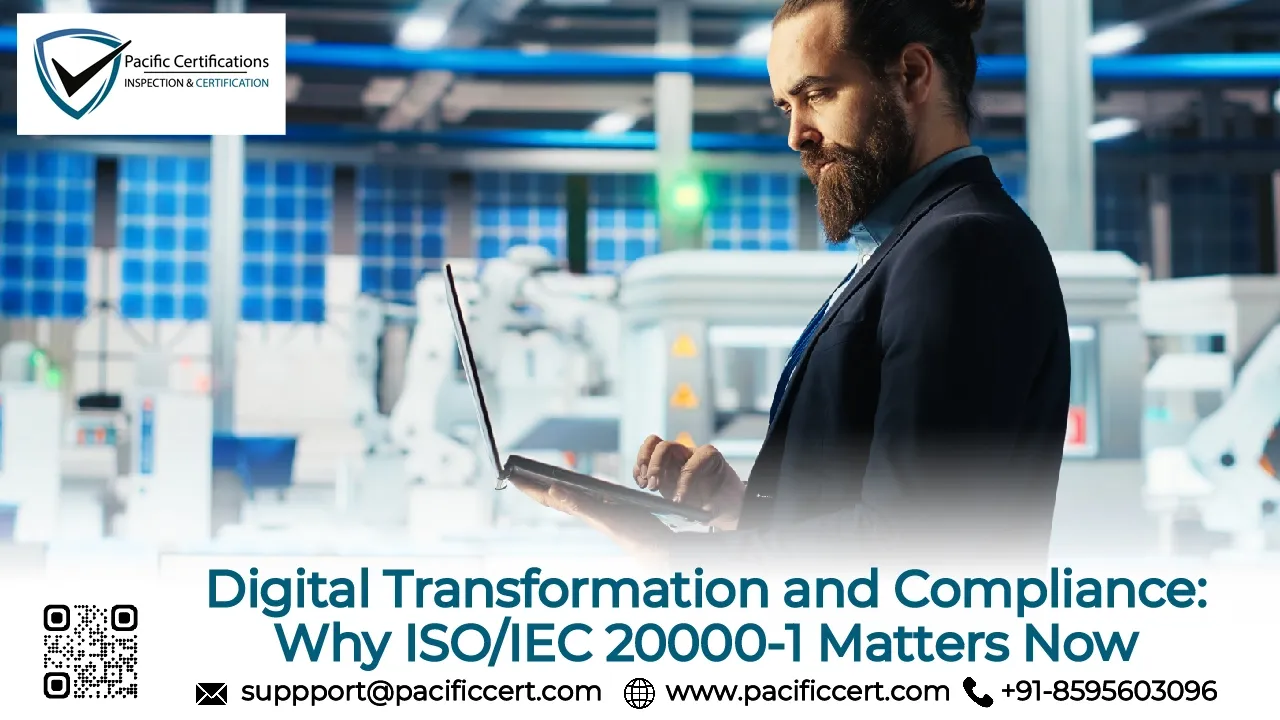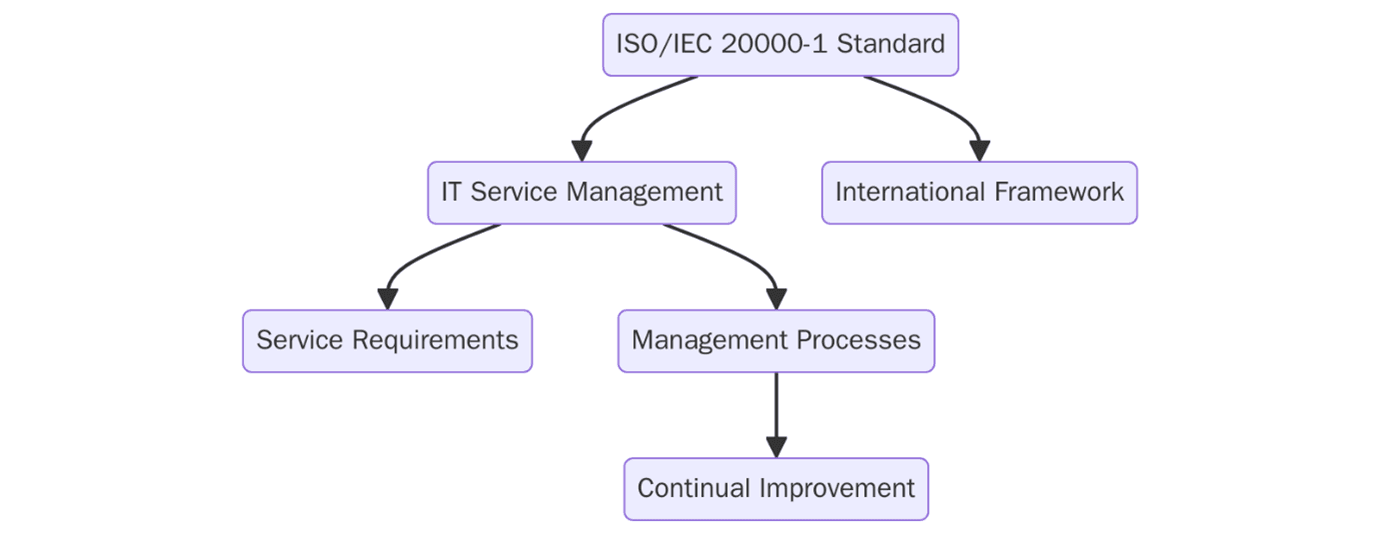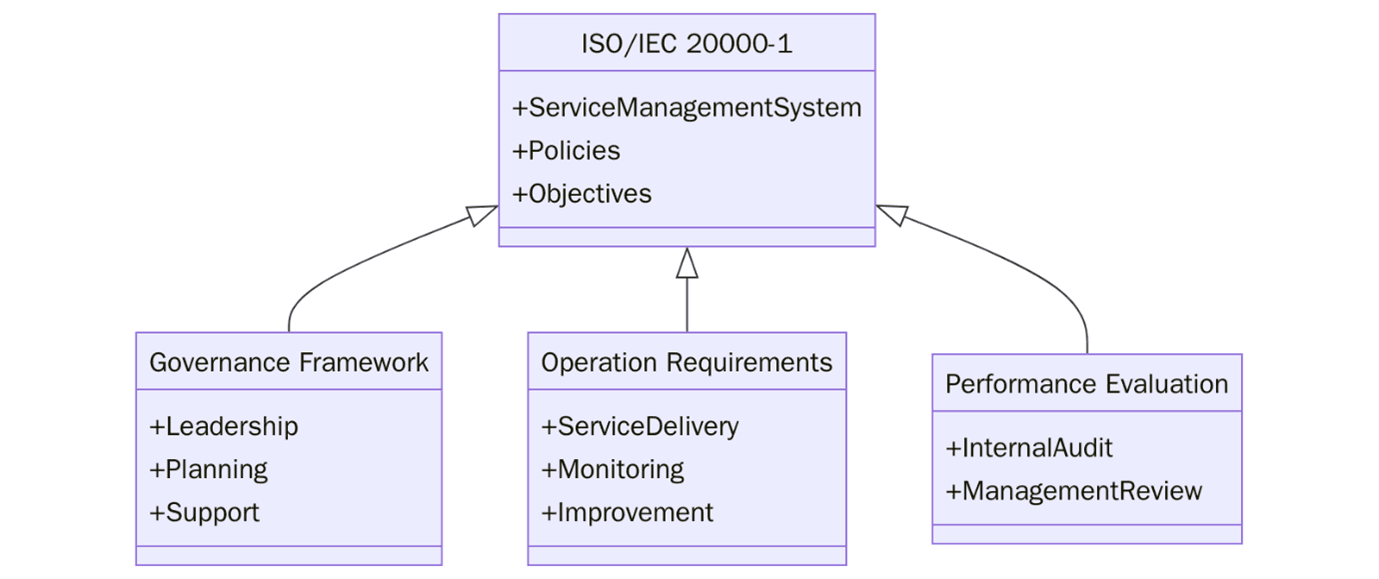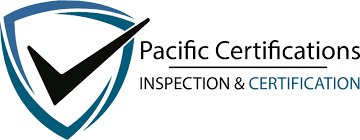Digital Transformation and Compliance: Why ISO/IEC 20000-1 Matters Now

Introduction
In the fast-paced era of digital transformation, organizations are aggressively adopting cloud computing, AI-driven platforms, DevOps and agile methodologies to deliver more value at speed. Yet, amid this tech-driven evolution, one critical question remains: Can your IT services consistently meet business requirements while ensuring reliability, compliance, and accountability? This is where ISO/IEC 20000-1, the international standard for IT service management (ITSM), becomes vital.
As digital environments grow more complex, service management has shifted from an operational support function to a strategic compliance and business enabler. ISO/IEC 20000-1 provides a structured framework to ensure that IT services are aligned with business goals, continuously improving, and resilient against risk. Its relevance has grown tremendously in 2025, not only due to increased regulatory oversight and customer expectations for service consistency.
Looking to align your digital infrastructure with global ITSM standards? Contact [email protected] to begin your ISO/IEC 20000-1 audit or training journey!
What is ISO/IEC 20000-1?
ISO/IEC 20000-1:2018 is the leading international standard for IT service management, providing guidelines for establishing, implementing, maintaining, and improving a service management system (SMS). It is aligned with the ITIL (Information Technology Infrastructure Library) framework and is compatible with other management system standards like ISO 27001, ISO 9001, and ISO 22301.

The standard enables organizations to manage the entire service lifecycle from planning and delivery to monitoring and improvement. By adopting ISO/IEC 20000-1, organizations can ensure their IT services are effective, efficient, secure, reliable, and customer-focused.
Purpose of ISO/IEC 20000-1 in the Digital Era
The primary purpose of ISO/IEC 20000-1 is to transform IT service management from a reactive support function into a governed, predictable, and business-aligned system. As digital transformation initiatives accelerate across industries, the risks associated with poor service delivery downtime, data loss, regulatory breaches have increased.
ISO/IEC 20000 helps organizations:
Standardize ITSM processes and reduce operational variability
Ensure service quality, reliability, and availability across the enterprise
Align IT services with evolving business needs and customer demands
Demonstrate control and compliance to regulators and stakeholders
Support cost optimization through structured service management
Struggling with fragmented IT operations or service outages? Let Pacific Certifications guide your ISO/IEC 20000-1 certification. Contact us at [email protected].
Scope and Applicability
ISO/IEC 20000-1 is applicable to all organizations, regardless of size, sector, or geography that provide IT services to internal or external customers. It applies to:
Managed service providers (MSPs)
Government IT departments
In-house corporate IT teams
SaaS and IaaS solution providers
Financial institutions and healthcare systems
Telecom, logistics, and infrastructure service platforms
Whether you're running hybrid cloud platforms, mobile-first services, or legacy enterprise systems, ISO/IEC 20000-1 provides a flexible and scalable framework to unify and govern service management practices. Its modular structure allows for partial or full implementation based on organizational needs.
Key Requirements and Governance Framework
ISO/IEC 20000-1:2018 is structured around a Plan-Do-Check-Act (PDCA) cycle, ensuring that service management evolves continually. Its requirements cover a wide range of operational and strategic areas, such as:

Service planning and control
Service portfolio and design management
Service delivery and availability management
Relationship and customer satisfaction processes
Incident, problem, and change management
Asset, capacity, and information security alignment
Governance is a key pillar of ISO/IEC 20000. It mandates that top management take responsibility for defining the service management policy, establishing objectives, allocating resources and ensuring that accountability and oversight are clearly defined.
This governance-centric approach ensures that service performance isn't just a technical issue but a strategic leadership priority, particularly important as IT services become essential to customer experience and digital business models.
Want to position your company as a globally trusted service provider? Begin your ISO/IEC 20000 journey with Pacific Certifications. Reach out at [email protected].
Implementation Timeline
Organizations with existing ISO systems (27001, 9001) may experience shorter timelines due to overlapping structures.
Benefits of ISO/IEC 20000-1 Certification
Implementing ISO/IEC 20000-1 delivers both operational and strategic advantages:

Enhances consistency, performance, and customer experience in IT services.
Demonstrates due diligence in sectors like healthcare, finance, and telecom.
Reduces downtime, eliminates redundancy, and enables better incident response.
Easily aligns with ISO 27001 (information security), ISO 9001 (quality), and ISO 22301 (business continuity).
Helps service providers win contracts and boost credibility in competitive markets.
Market Trends
The adoption of ISO/IEC 20000-1 is rising sharply across both public and private sectors as organizations grapple with the challenges of digitization, remote workforce support, and increasing service complexity. In the United States, sectors such as financial services, e-commerce, insurance, and healthcare are leading the adoption, driven by both regulatory pressure and customer demands for 24/7 service availability.
Across Europe, ISO/IEC 20000-1 is often mandated in public tenders, especially in the UK, Germany, and the Netherlands, where IT service excellence and vendor accountability are critical. In Asia-Pacific, fast-growing economies like India, Singapore, Australia, and Japan are integrating ISO/IEC 20000 into their digital government, smart city, and cloud service transformation programs.
As multi-cloud and DevOps environments become more prevalent, ISO/IEC 20000 serves as a unifying framework that aligns disparate teams, tools, and platforms under a shared set of service management principles. Globally, it’s helping organizations build trust, demonstrate resilience, and compete effectively in a service-dominated economy.
How Pacific Certifications Can Help?
As an accredited certification body, Pacific Certifications supports organizations in achieving ISO/IEC 20000 certification with a structured, professional, and global approach. Our services include:
Comprehensive gap analysis and readiness reviews
Stage 1 and Stage 2 certification audits by experienced ITSM auditors
Annual surveillance and re-certification audits
Pre-certification audit support and corrective action guidance
ISO/IEC 20000 integration with ISO 27001, 9001, or 22301 systems
We also offer training and documentation support through our professional learning programs to build long-term ITSM capabilities.
Contact us today at [email protected] to get your certification process started!
Training Programs by Pacific Certifications on ISO/IEC 20000-1
Pacific Certifications offers structured training programs to build competency in ISO/IEC 20000-1 implementation and auditing. These programs are designed for ITSM professionals, compliance teams, and leadership stakeholders.
ISO/IEC 20000-1 Lead Implementer Training
Covers the full implementation lifecycle of an ITSM based on ISO/IEC 20000, including integration with ITIL and other standards.
ISO/IEC 20000-1 Lead Auditor Training
Prepares professionals to perform internal or third-party audits of service management systems.
ISO/IEC 20000-1 Awareness Training
Provides foundational knowledge of service management principles, terminology, and structure under the ISO/IEC 20000 framework.
Interested in enrolling your team or organizing corporate training? Contact our training division at [email protected] for upcoming sessions and custom proposals!
Contact Us
If you need support with ISO certification for Digital Transformation and Compliance, contact us at [email protected].
Read More at: Blogs by Pacific Certifications

